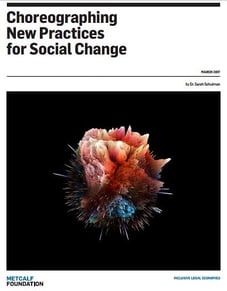InWithForward brings research and development to social services to improve outcomes for people living on the margins.  Our aim is to re-imagine and redesign social services, “to turn social safety nets into trampolines so that everyone has an opportunity to flourish. That means: using, enjoying, and developing our human capacities. Not just having a roof over our heads and food on the table.”
Our aim is to re-imagine and redesign social services, “to turn social safety nets into trampolines so that everyone has an opportunity to flourish. That means: using, enjoying, and developing our human capacities. Not just having a roof over our heads and food on the table.”
We recently published, Choreographing New Practices for Social Change, a document that highlights how our network of non-profits, social scientists and service designers works with people at the margins – and the staff at agencies that support them – to build front-line innovation teams; source scalable solutions; and, spread stories of learning, innovation and change using the lens of experimentation.
A key outcome that emerges through the experimentation process we embrace is a reframing of the initially perceived problem. This is achieved by working with a diversity of people to re-frame that problem in terms of the actual pain experienced. In my recent blog about this process of reframing, I shared four rules of thumb for redefining problems from the perspective of every day people. These are:
1. Name deficits and excesses
We often start problem statements with the phrases, “Too many…” or “Too few…” For example, "There are too few adults with a cognitive disability who have a source of novelty and learning." Or, "There are too many young people who are unemployed." This is what differentiates a social problem from a personal problem: there is a group of people experiencing the same lousy thing. This is also why people are always the subject of our problem statements. We would say, “There are too many young people who are unemployed” rather than, “There are too few jobs.”
2. Identify Pain, for Whom
Once we’ve got a statement, we like to interrogate it and ask the hairy 'so what' questions. So, what if there are too many young people who are unemployed? Who experiences the pain of that problem, and what kind of pain?
Is it parents of young people who are unemployed who experience the pain to their pocket books and psyche? Is it the young people themselves, and their self-esteem & identity? Is it employers who are experiencing the pain of missing out on a good resource? We try and name potential pain points as a starting point for ethnographic field work.
3. Bound in Place
To give our ethnographic field work some rootedness, we start local: in one social housing complex or neighborhood or geographically distinct area. Our goal isn't to do statistically representative work or to make generalizable claims about a problem. Our goal is to go deep and understand a handful of people’s lived experiences. All so we can generate ideas of what could be different that we then test with larger numbers of people.
4. Do Not Assume Solutions
We avoid problem statements that infer the answer so that we can keep our ethnographic research open and exploratory. Statements like: “There are not enough low-income housing units for homeless people,” assume that houses are the solution to homelessness. Instead, what is the pain that folks who are homeless are experiencing? Is it the lack of privacy, or stability, or protection from inclement weather, or… Each of these pain points could lead to quite different and creative solutions.
InWithForward is currently building Canada's first shared Social Research & Development platform. After a decade of trying to embed experimental approaches throught one-off projects, there's a real need for permanent infrastrtucture. Social sector agencies were designed to deliver servies; they weren't set up to continuously identify assumptions, generate alternatives and test time. Over the next year, we're enabling non-profits, their staff, families, funders, accreditors, and licensors to come together to innovate from the ground up. Email us at: hello@inwithforward.com to learn more and get involved.
Learn More:
- Visit the InWithForward website and read Sarah Schulman’s Blog Fay and Problem (Re)Framing
- Download InWithForward’s Choreographing New Practices for Social Change
- Email InWithForward to learn about Canada's first shared Social Research & Development Platform
- For more on residents & organizations collaborating to reimagine neighbourhoods, join us for Neighbourhoods ♥ The Heart of Community: Mobilizing for Impact – June 6-8, 2017, Montréal, PQ





